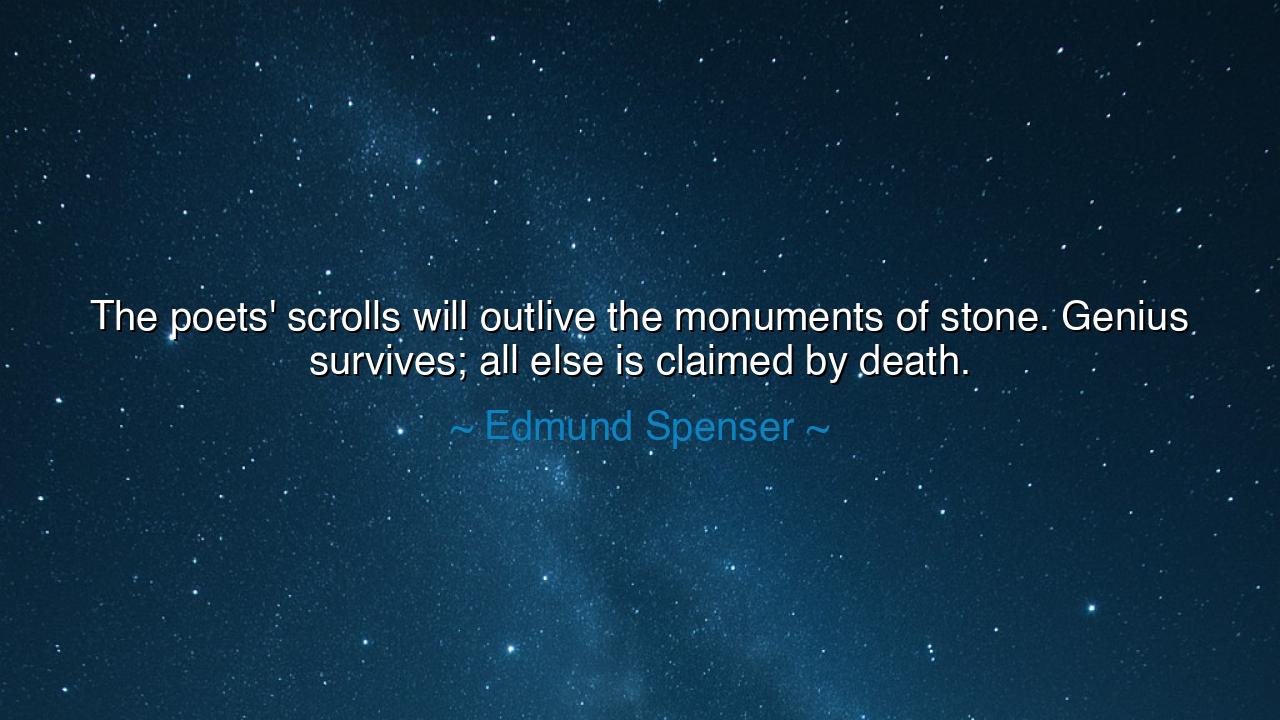
The poets' scrolls will outlive the monuments of stone. Genius
The poets' scrolls will outlive the monuments of stone. Genius survives; all else is claimed by death.






“The poets’ scrolls will outlive the monuments of stone. Genius survives; all else is claimed by death.” Thus wrote Edmund Spenser, the great Elizabethan poet, whose words have themselves defied the centuries to prove the very truth they proclaim. In this noble declaration, Spenser reveals a vision that transcends time—the understanding that art and intellect, born of the soul, endure long after the body and the structures of men crumble to dust. For while stone may resist the weather of years, it cannot withstand the greater force of forgetfulness; only the living spirit of genius, expressed through words and thought, remains eternal.
The origin of this quote comes from Spenser’s own reflections on the purpose of poetry and the nature of immortality. Living in the age of Queen Elizabeth I, he witnessed the rise of empires and the fall of kings, the construction of grand palaces, and the decay of human ambition. Yet he also saw how the verses of Homer, Virgil, and Dante had survived the passing of millennia. Where warriors and rulers had been buried beneath their monuments, the poets still spoke, their voices clear as when first sung. Thus, Spenser proclaimed that while death claims all material things, genius—the divine flame of creativity—lives beyond the grave.
To say that “the poets’ scrolls will outlive the monuments of stone” is to affirm that the word is mightier than the world. Monuments are built of strength, yet they fade; poems are made of breath, yet they endure. The chisel carves in marble, but the poem carves in memory. For the word touches the heart, and the heart preserves what the hand of time cannot erase. Spenser understood that when a man writes with truth and beauty, he builds not a tomb, but a temple of immortality—one that stands not in the earth, but in the minds of those who come after.
History itself offers abundant proof. Consider Ozymandias, the mighty king of old, whose monument once boasted of his greatness: “Look on my works, ye mighty, and despair!” Yet when centuries passed, his empire vanished, and his statue lay broken in the sand. Only the poet Percy Bysshe Shelley, who wrote of Ozymandias’s ruin, still speaks to us. The poet’s scroll endures, while the monument of stone lies forgotten. Thus, it is not the conquerors who outlive time, but the creators—the ones who speak to the human soul.
Spenser, too, saw himself as part of this lineage of immortals. Through The Faerie Queene and his sonnets, he sought to capture the eternal virtues—love, courage, holiness—that would outlast the politics of his age. He knew that kingdoms perish, but truth and imagination do not. His works became the foundation of English poetry, inspiring Shakespeare, Milton, and countless others. In honoring beauty through art, he defied death itself, proving that genius survives even when flesh and stone decay.
This quote also carries a spiritual lesson for all who live and labor upon the earth. It calls us to seek not the monuments of pride, but the works of meaning. Wealth, fame, and power perish quickly; only the creations that touch the soul endure. Whether one writes, teaches, paints, or loves, every act born from the higher self becomes a kind of poem—something that transcends time’s reach. To live creatively, kindly, and truthfully is to participate in that immortal current of genius that Spenser so revered.
The lesson, then, is clear: build not only with hands, but with heart. Strive not only for recognition, but for resonance. Speak, write, and live in a way that adds light to the world’s memory. For all else—titles, riches, palaces, and statues—will fall to ruin, but a single line of truth, a single act of love, will endure beyond death.
So, O seeker of meaning, remember the wisdom of Edmund Spenser: genius survives; all else is claimed by death. The hand may falter, but the spirit remains. Let your life be a poem written not on paper or stone, but on the fabric of eternity. For though death will take the body, it cannot take the soul’s creation—and in that creation, you too shall live forever.






AAdministratorAdministrator
Welcome, honored guests. Please leave a comment, we will respond soon